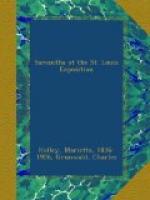The machinery of this clock, what makes it go, is up above a little ways on the hill in a small pavilion. There are glass doors, and you can look in and see the works of the clock. A great bell there strikes off the hours and quarter hours, and there is a big hour-glass there too. One thousand electric lights light it up at night so folks can see day or night jest how time is passin’ away.
Agricultural Building is the largest on the ground. The two palaces of Agriculture and Horticulture stand up on a beautiful hill surrounded by orchards, gardens, vineyards, shrubs, vines of all sorts. This outside exhibit covers fifty acres. There are beautiful lakes full of the rarest aquatic plants, from the great Egyptian lotus, whose leaves are large and strong enough to hold up a good-sized child, and all kinds of smaller plants, but jest as beautiful; indeed, there is everything rare and lovely in that display that ever grew in water or on land, and they make it one of the most beautiful places of the hull Exposition.
The enormous display outside and inside covers seventy acres, and every inch on ’em beautiful and instructive. The twenty acres covered by Agricultural Hall contains everything relating to the soil and its cultivation, everything that Mother Earth gives to man, all the tools, implements of every kind used in agriculture, ploughs, reapers, mowers, threshers, etc., run by horse-power, steam or electricity.
Among the ploughs we see a small old-fashioned one made of wood, used by Daniel Webster when he wuz a poor farmer boy. Workin’ hard at his humble work but his boyish mind, most probable, sot on sunthin’ fur above, lookin’ at the hard soil ahead on him that he must break up, with them wonderful, sad, eloquent eyes of hisen, and seein’ visions, no doubt, and dreamin’ dreams. Callin’ out to his oxen or horses, “gee,” or “whoa” as the case might be, and they not sensin’ the fact that this voice wuz goin’ to give utterance to silver-tongued, heart thrillin’ eloquence in the highest places of Europe and his native land.
As I looked at it pensively I pictured the tired boy holdin’ the onhandy handles of the plow and trudgin’ along behind his team through the long sultry days, and thought to myself, what hopes and dreams and ambitions wuz turned over by that old plow as well as green-sward.
Right by that little plow wuz a big powerful one that went by electricity. A sight that would probable looked as strange to Daniel, could it have appeared to him then, as any of his wildest day-dreams materilized.
And there wuz all the methods of irrigation, draining, engines, wind-mills, pumps, farm wagons, all kinds of fruit, sugar canes, vegetable sugar, candy stores, confectionery displays, vegetables of all kinds that wuz ever hearn on, some on ’em of such monster size that you never dremp on ’em, unless it wuz in a night-mair.




